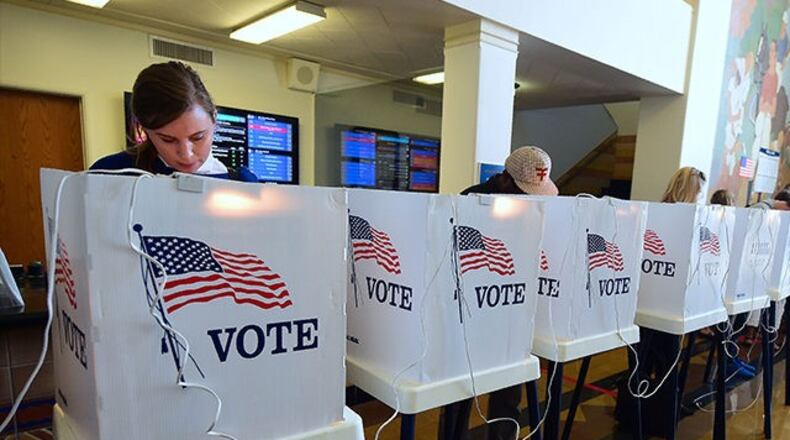Attempted cyber attacks, Russians trying to influence American democracy and allegations of voter fraud and suppression are now top issues for Ohio’s chief elections officer.
Running for the job are Democrat Kathleen Clyde, D-Kent, Republican Frank LaRose, R-Hudson, and Libertarian Dustin Nanna.
Clyde and LaRose are current lawmakers who agree to disagree but be civil about it.
“I have always tried to practice civility and think that is desperately needed in discourse today,” Clyde said.
“Civility is a problem that is never solved. It’s kind of like peace or hunger,” said LaRose who works with the National Institute for Civil Discourse. “But I think we can make steps to improve things.”
Related: Stop the name calling and bring back civility, group says
LaRose, an Eagle Scout, is a U.S. Army veteran who served in the U.S. Special Forces as a Green Beret. He served in Iraq, Kosovo and with a counter-narcotics task force on the U.S.-Mexico border. LaRose, 39, earned a business degree from Ohio State University and joined the Ohio Senate in January 2011.
Related: What is State Issue 1 on the ballot?
Clyde, 39, earned her undergraduate degree at Wesleyan University and law degree at Ohio State University. Before becoming a lawmaker in 2011, she served as staff in the Ohio Senate and Ohio House, worked on voting rights issues in the Ohio Secretary of State’s office and directed early voting for Franklin County in 2008.
If elected, Clyde said she would push for an automatic voter registration system — registering citizens when they receive driver’s licenses or state ID cards without requiring them to opt into the voting system; shift away from electronic voting equipment to machines with verified paper ballots; increase transparency in campaign finance by forcing disclosure of donors giving to dark money groups and making certain foreigners aren’t contributing; and stop purging voters from registration rolls on the basis of infrequent voting.
“There is a culture of corruption and scandal that is unprecedented in our state government. I think gerrymandering is a big part of that and the flow of political money into our system. It’s time for a new direction in our state. We need leaders willing to reach across the aisle, who are pragmatic and who will bring necessary change to this state,” said Clyde. “I am that candidate.”
If elected, LaRose said he would work for fair legislative and congressional districts,encourage voter participation, use the latest technology to update voter databases and create more opportunities for voters to update their registration information, and kick off a bipartisan discussion about updating voter roll purging practices.
“We want somebody that’s going to call balls and strikes and run fair elections and not inject partisanship into the process,” LaRose said.
Nanna, from Delaware, north of Columbus, says if elected he will use the office “as a bully pulpit for the people’s right to vote.”
One of Nanna’s proposals is to have “polls open all day Sunday before Election Day.” Currenly on that day early voting is only from 1 to 5 p.m.
As legislators of the past eight years, both LaRose and Clyde have zeroed in on election and voter issues as well as establishing the new redistricting system. Each present themselves as the ‘go-to’ lawmaker on election issues.
Ohio Democrats complain that LaRose supported eliminating “golden week” when Ohioans could register to vote and cast a ballot at the same time; make it harder for citizens to gather petition signatures for initiatives and referendums; and voted in favor of gerrymandered maps.
But LaRose says he introduced a bipartisan redistricting plan in 2011 with Democrat Tom Sawyer; sponsored a bills that provided money for electronic poll books and new voting machines; and advocated to keep 28 days of early voting when some Republicans wanted to cut it back further.
As freshmen lawmakers in 2011, LaRose and Clyde took opposite sides on the contentious Senate Bill 5 — an effort to gut collective bargaining rights for police, firefighters, teachers and thousands of other public workers across the state. Clyde voted no; LaRose voted yes.
In this campaign, though, LaRose has won the backing of the Ohio Conference of Teamsters and Fraternal Order of Police of Ohio as well as Ohio Right to Life, Ohio Chamber of Commerce and Ohio Society of CPAs.
“As I look back on (my yes vote on SB5) am I confident I did the right thing? Not necessarily,” he said.
Clyde is endorsed by the Human Rights Campaign, NARAL Pro-Choice Ohio, EMILY’s List, Ohio AFL-CIO, Ohio Education Association and Ohio Federation of Teachers, SEIU Local 1199, AFSCME Ohio Civil Service Employees and other labor groups.
—-
OHIO POLITICS HAS YOU COVERED
Newsletter: Sign up for our daily Ohio Politics newsletter for the latest on Election 2018 and the news of the day
Twitter: Stay up to date with the latest from the campaign trail on @Ohio_Politics
Facebook: Speak out on the issues and candidates on our Ohio Politics Facebook page
OHIO POLITICS HAS YOU COVERED
Newsletter: Sign up for our daily Ohio Politics newsletter for the latest on Election 2018 and the news of the day
Twitter: Stay up to date with the latest from the campaign trail on @Ohio_Politics
Facebook: Speak out on the issues and candidates on our Ohio Politics Facebook page
About the Author




